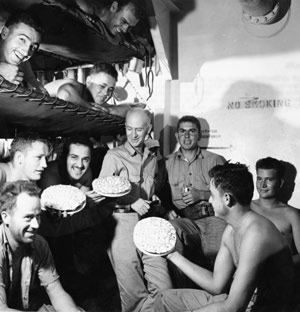Once in a while, Pyle told funny stories.
SOMEWHERE IN FRANCE, June 21, 1944 – The war is constantly producing funny things as well as tragic things, so I might as well tell you some of our lighter incidents.
For example, the first night we spent in France one of the colonels who slept with us under an apple tree was an Army observer from Washington. Usually we don’t care for observers from Washington, but this colonel was a very nice guy and a good field soldier too, and everybody liked him.
While we were eating our K-rations next morning he said he had slept fine for the first hour, before we had moved in under our jeep for protection from the flak. He said that before we moved he had found a nice little mound of earth to put his head on for a pillow. He said that all his life he had had to have a pillow of some kind. After moving under the jeep he couldn’t find anything to put his head on.
With that he walked over a few feet to show us the nice mound of earth. When he looked down he started laughing. His excellent pillow of the night before had turned out in the light of day to be a pile of horse manure.
*
Another story concerns a masterful piece of wartime understatement by one of our truck drivers, Pvt. Carl Vonhorn of rural Cooperstown, New York. He had pulled into an apple orchard adjoining ours the night before, parked his truck in the darkness, spread his blankets on the ground in front of the truck, and gone to sleep.
When he woke up at daylight Vonhorn looked about him sleepily. And there on the ground right beside him, within arm’s reach, was a dead German soldier. And when he looked on the other side, there, equally close, were two potato-mashers. Pvt. Vonhorn got up very quickly.
Later he was telling his officers about his startling experience, and he ended his description with this philosophical remark: "It was very distasteful."
Everybody thought that was so funny it spread around the camp like fire, and now the phrase "It’s very distasteful" has become practically a byword.
*
After breakfast that first morning we had to round up about fifty dead Germans and Americans in the series of orchards where we were camping, and carry them to a central spot in a pasture and bury them.
I helped carry one corpse across a couple of fields. I did it partly because the group needed an extra man, and partly because I was forcing myself to get used to it, for you can’t hide from death when you’re in a war.
This German was just a kid, surely not over fifteen. His face had already turned black, but you could sense his youth through the death-distorted features.
The boys spread a blanket on the ground beside him. Then we lifted him over onto it. One soldier and I each took hold of a foot, and two others took his arms. One of the two soldiers in front was hesitant about touching the corpse. Whereupon the other soldier said to him:
"Go on, take hold of him, dammit. You might as well get used to it now, for you’ll be carrying plenty of dead ones from now on. Hell, you may even be carrying me one of these days."
So we carried him across two fields, each of us holding a corner of the blanket. Our burden got pretty heavy, and we rested a couple of times. The boys made wisecracks along the way to cover up their distaste for the job.
When we got to the field we weren’t sure just where the lieutenant wanted the cemetery started. So we put our man down on the ground and went back for instructions. And as we walked away the funny guy of the group turned and shook a finger at the dead German and said: "Now don’t you run away while we’re gone."
*
The Germans leave snipers behind when they retreat, so all American bivouac areas are heavily guarded by sentries at night. And the sentries really mean business.
The other night a pretty important general whom I know was working late, as all our staff officers do these days. About midnight he left his tent to go to another general’s tent and talk something over.
He had gone only about twenty feet when a sentry challenged him. And just at that moment the general, groping around in the dark, fell headlong into a deep slit trench.
It was funny, even to the general, but there was nothing humorous about it to the sentry. He suspected monkey business. He rushed up to the trench, pointed his gun at the general, and in a tone that was a mixture of terror and intent to kill, he yelled: "Git out of there and git recognized, you!"
["Potato-masher" was a term meaning hand grenade]



